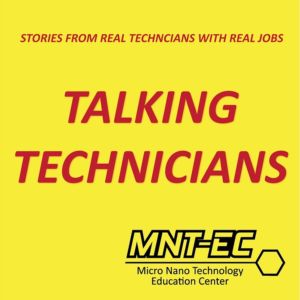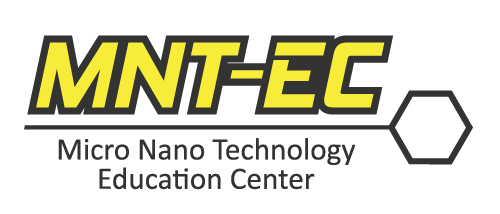
The podcast about micro and nano technicians: Who they are, what they do, and how they got there. Hosted by Peter Kazarinoff and supported by the Micro Nano Technology Education Center (MNT-EC) and the National Science Foundation (NSF) Advanced Technological Education (ATE).
The mission of the Talking Technicians Podcast is to share the background, education and work experience of employed technicians with future technicians and technician educators in the form of a podcast.
New episodes are released on the first of each month. You can listen to them on the MNT-EC website or the MNT-EC YouTube channel.
Jared Ashcroft, PI, is a member of the natural sciences faculty at Pasadena City College in Pasadena, CA. He brings his expertise in undergraduate research and technician education and a passion for nanobiotechnology.
Mel Cossette, Co-PI, is also the PI of MatEdU, another ATE resource center. She brings her expertise in material science, technician education and industry.
Greg Kepner, Co-PI, is the former PI of the Midwest Photonics Education Center (MPEC), he brings his expertise in photonics and optics and technician education.
Neda Habibi, Co-PI, is faculty at the Northwest Vista College in San Antonio, TX. She brings her expertise in nanobio technology and technician education.
Peter Kazarinoff, Co-PI, is faculty at Portland Community College in Portland, OR and was the center manager of the now sun set SHINE center. He brings his expertise in nanoscience and technician education.
Billie Copley, Center Manager, is the former Project Manager for the now sun set Nano-Link Center and brings her expertise in project management and nanoscience education.
The Micro Nano Technology Education Center has partnered with the Micro Nano Technology education Special Interest Group (MNTeSIG) to expand the working groups that were started by the MNTeSIG community. This partnership allows for a more diverse and broad reach across the different sectors that micro and nano technology touches.
There are currently five working groups and each group is assigned with a different task. Each group meets monthly and works on their goals and objectives that they established. If you would like to learn more about the working groups or if you wish to join one, please go to www.mntesig.net
Professional Development Working Group - Led by Bob Ehrmann and Jim Smith
Outreach Working Group - Led by Greg Kepner and Billie Copley
Curriculum Working Group - Led by Marco Curreli and Neda Habibi
Distance Education Working Group - Led by Rick Vaughn
Industry Working Group - Led by Cait Cramer and Matt Pleil

The National Science Foundation's Advanced Technological Education (ATE) program has been funding innovation at two-year colleges for over twenty years. With a focus on the education of technicians for the high-technology fields that drive our nation's economy, and strong partnerships between academic institutions and industry, ATE promotes improvement in the education of science and engineering technicians at the undergraduate and secondary school levels.
To learn more about ATE, please visit the NSF ATE program home page.
This national center is led by Pasadena City College in collaboration with Edmonds College, Portland Community College, and University of North Texas. In addition, MNT-EC connects existing micro and nano NSF ATE Resource Centers (NACK, SCME, NEATEC, and MatEdu). As a result, MNT-EC is able to leverage a broad set of expertise to prepare a nationwide skilled technical workforce for manufacture of micro and nano products.
The mission of MNT-EC is to grow the MNT technician workforce by fostering academic and industry mentorship between existing MNT partners and educators developing prospective community college MNT programs.
Each member of MNT-EC brings resources, such as cleanrooms, educational materials, and remote operation of lab instruments, to support and inform the development of a common curriculum for associate degrees and certificates in micro nano technologies. The content of this curriculum will be informed by the needs of industry members using a Business Industry Leadershp Team (BILT) model. Industry KSA's will be updated via annual reviews between academic and industry members.
The faculty of the academic institutions will remain current in micro- and nanotechnology innovations via periodic workshops or webinars across the various specializations (such as safety, fabrication, operations) provided by the academic and industry members. The MNT-EC will map where the micro- and nanotechnology industry is greatest and where it is growing and promote adaptation of the MNT-EC curriculum at regional two-year institutions near these locations.

The Journal of Advanced Technological Education (J ATE) is a peer-reviewed technical journal for ATE Projects and Centers. Publishing in J ATE is a way for community college educators to disseminate their work and share their learnings with the wider technical education community. The Journal is free to publish in and free to read. There are no subscription or submission fees. Our authors come from ATE Projects, ATE Centers and Community College faculty as well as University education researchers and industry personnel. Our target audience are community and technical college faculty and staff as well as K-12 educators, and industry members. The Journal is supported by MNT-EC, the Micro Nano Technology Education Center with participation from InnovATEBIO, the National Center for Bio Technologies and NCAT, the National Center for Autonomous Technologies.
Topics that are covered in J ATE:
Articles and short communication on many topics relevant to teaching and learning in technician education at all levels, including innovative pedagogical methods and related research.
Articles that demonstrate new educational activities, lab experiments, instructional methods and pedagogies that can be adopted in community and technical colleges
Publishing in peer-reviewed technical journals is a great way to disseminate your work, advance your career and share your research with like-minded educators.
We welcome your submissions to J ATE